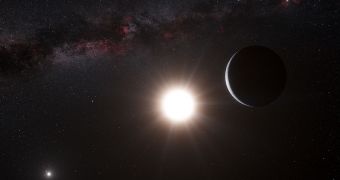Most scientifically inclined people always believed that there were planets outside of our solar system. Most scientifically inclined people have always believed that there is life outside of our solar system, for that matter, it's statistically very unlikely to the point of being impossible that it isn't so.
As our methods for observing the universe have gotten better, we started finding planets outside of our home system. Life, so far, has eluded us, but it's only a matter of time, if only judging by the sheer number of planets in our galaxy alone.
The latest estimates say that the Milky Way is home to at least 100 billion planets, though the number could be a lot bigger. There are roughly 100 billion stars in our galaxy, 75 percent of those being M dwarfs, smaller and cooler than our sun.
A team of scientists used one such star, Kepler 32, to model the entire galaxy. Kepler has already uncovered five planets circling the star in close orbits. Kepler also found other M dwarf stars with a similar number of planets near their parent stars.
So the scientists used this as a model to come up with a rough estimate of the number of planets in the galaxy and came up with the 100 billion planets number. The results are published in The Astrophysical Journal.
But there are several big caveats to their method which could mean that the real number is significantly larger. For one, they only looked at M dwarf planets and only small, rocky ones at that. No other planet types and star types were included.
That's 25 billion stars that could have planets, which were not included in the count. Then there's the source of the data itself, Kepler is only able to see either very big planets or planets orbiting very close to their stars.
As better detection methods are devised, we may find that what we're seeing now is only a small portion of the whole picture, i.e. more types of planets around more types of stars.
Finally, there's no account for exoplanets that have been spun off from the orbit around their stars and are now flying about in the galaxy. Some estimates believe that the number of these planets is comparable to the ones still in orbit.
In the end, it is very likely that the actual number of stars in the galaxy is several times bigger than the 100 billion estimate.

 14 DAY TRIAL //
14 DAY TRIAL //